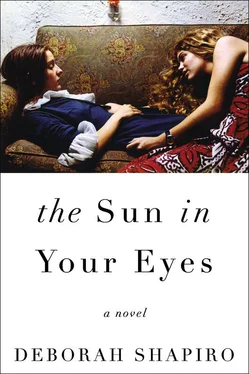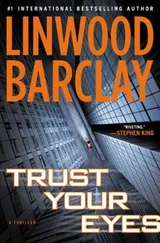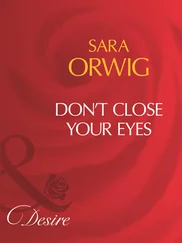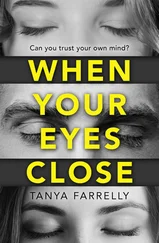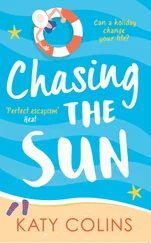Deborah Shapiro
The Sun in Your Eyes
Remember it happy; the sun in your eyes.
— NICHOLAS MOSLEY, ACCIDENT
Annie Davis
The Village Voice , March 3, 1975
I’ll admit it: Jesse Parrish used to make me feel bad. Uptight. Not very rock and roll. Like the angry, anxious (ethnic?) New Yorker that I am. He always seemed to be asking, in his easy L.A. way: Why are you trying so hard? He made me question what I was seeking. Communion? Transcendence? Freedom? A revolution? He couldn’t be bothered with your politics and their complications, he was too busy sustaining eye contact. Too busy, essentially, being sex. He was always so distractingly good-looking and sang with such aching need that you forgot to want anything else and what was my point?
Oh, yes. His one-off show at the Academy of Music last Saturday night. It’s been less than a year since he released his latest album, The Garden of Allah, and then disappeared from view amid rumors he was getting clean or seeking psychiatric help. I wasn’t so sure I cared for that troubling record. Stark. Cryptic. Mercurial. It struck me as a fuck-you much more than a fuck-them and I couldn’t find a way in. I struggled with just about every song and called it quits at the end of “Goodnight” when he repeats the line “Tell me you care” (I didn’t). I heard it as taunting and cold, directed at someone he was ready to be done with. And it was as if he had to voice the line a few times merely to keep himself from falling asleep. The final word in bored detachment. But when he sang it on stage last weekend — tell me you care— it turned into a plea, an urgent, compulsive mantra. It was sad, searching, and sublime. I’ve sometimes thought of Jesse as a lesser, slightly campier Neil Young, and did I need a lesser, campier Neil Young? Maybe I did and never knew it. Maybe I never took him seriously enough. I don’t think I could have before this.
Something has changed. Gone are the form-fitting, flamboyant outfits he used to slink around in. Gone, too, the flab and that mustache that followed, a kind of bizarro overcorrection. Let’s never speak of it again. Except to say that for a short while there Jesse looked the way so much rock music sounds these days. Bloated. Lumbering. Blah. I caught an echo at his show of what I used to hear, what it used to mean to me, what I wanted. What, deep down, I still do. Communion, transcendence, freedom. Revolution? I don’t know. Call it rebellion. That spirit that never really goes away. It only goes underground if it has to, until it finds a new form, alive again. In the meantime, I’ll be patient. I’ll wait it out with Jesse Parrish. I’ll tell you I care.
Jesse Parrish Dead in Car Crash By Reuters, June 24, 1978
New York — Jesse Parrish, the singer-songwriter and guitarist, died on the night of June 22nd. He was 31 years old. Police said Mr. Parrish was killed when the car he was driving veered off the road and into a ravine in the Catskill Mountains. His girlfriend, Marion Washington, was in the passenger seat. Ms. Washington suffered severe injuries and has been transferred to the intensive care unit of a Manhattan hospital, where she remains unconscious. Mr. Parrish was pronounced dead at the scene. The county coroner’s office has ruled it an accident.
Mr. Parrish, who is perhaps best known for his 1970 album Motel Television, had been separated from his wife, fashion designer Linda West, for nearly a year. He had struggled in the past with drug addiction. In recent months, however, he had temporarily left his home in Los Angeles and was staying at the upstate New York studio of producer Charlie Flintwick in order to record a new album and mount a comeback. “He was in great shape and in good spirits,” said Mr. Flintwick. “He’d surfaced. He was up.”
Fans have already flocked to the roadside where the accident occurred, creating a makeshift memorial. They expressed further dismay over reports that the recordings Mr. Parrish was making have disappeared from Mr. Flintwick’s property. “Your guess is as good as mine,” said Mr. Flintwick. “Jesse was something of a myth when he was alive. I suppose he’s going to be a legend now.”
Mr. Parrish is survived by his wife, Ms. West, and their four-year-old daughter, Lee.
some sort of alchemy Lee, 1996
There were many ways Lee tried to obscure the fact that she came from money, but flying coach wasn’t one of them. She’d done it, once, in a kind of defiance of her mother, only to realize that her small act of rebellion meant little to anyone but herself and wasn’t worth the lack of leg room. She took for granted luxuries like this, but she saw how they excited Viv. How her new — newish — friend took to the spacious first-class window seat like a just-crowned queen, poised but nervous.
“The good thing about being a catastrophist,” Viv was saying, “is that it makes me get everything in order, in case anything happens.”
“You mean, like, if we crashed?”
“Right, or if the house gets broken into while we’re away. Or, you know, if there’s an earthquake when we get to California.”
“What do you even need to get in order?”
“Things.”
“Things?”
Viv frowned, though she loved being drawn out.
“My journal. I have to make sure it’s in a safe yet accessible place. Not like anyone would want to read it.”
But you write in it as though you imagine someone will, thought Lee, who didn’t exercise any preflight precautions — didn’t plan for the worst, didn’t unplug toaster ovens or check the stove and the faucets. She simply got on planes. Viv at nineteen was already thinking in posthumous terms. Lee, twenty-one, was thinking in terms of. . what? Lee suspected Viv had what amounted to ambition, something she either didn’t have, or more likely, couldn’t admit to, for reasons she didn’t want to dwell on. They were going to Los Angeles.
“Have you ever been in an earthquake?” she asked Viv. When Lee had come east for college, she’d fielded countless variations on that question. What was it like to live in a place with fault lines, no seasons, just sun? She would come up with something to say but she could never explain exactly what it meant, to grow up in L.A.
“Once,” said Viv. “At a seafood restaurant in Maine, this place my family would go every summer. Checkered red-and-white oilcloths on the tables, buoys and lobster trawls on the walls, that kind of thing. My dad starts getting annoyed and tells my brother to stop shaking the table but then you could see, on the wall, this swordfish. Its nose had been pointed up and now was pointed down. Anyway, it turned out the epicenter had been in Quebec, and the seismic waves were weak by the time they reached New England, so it was basically just a quick ripple.” That look again on Viv’s face: Why do I say these idiotic things to you? But really it was a look within a look: You want to hear these things. And Lee did. She wanted to hear how Viv had parents who took her on vacations where they stayed at tidy motels, walked through paths of brambles to get to a rocky beach, and ate oyster crackers out of cellophane packets while waiting for their dinner to arrive in shallow plastic baskets. Viv could tell her the most mundane stories and Lee would find a point in them. I know this about you and you know that about me.
Читать дальше
